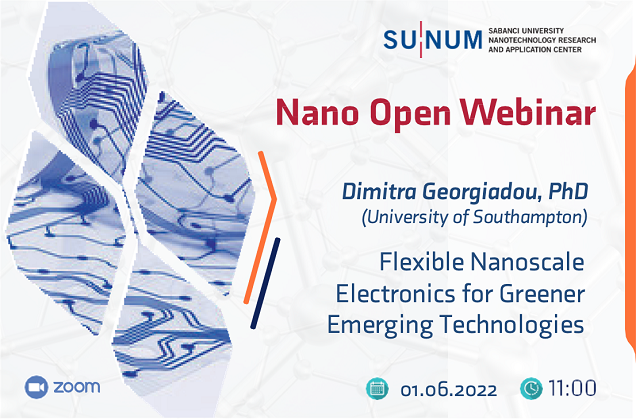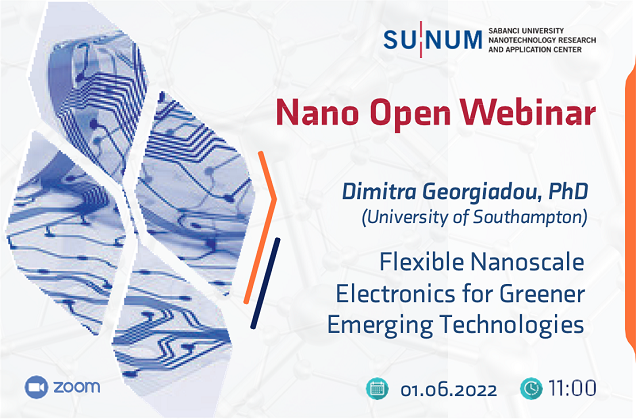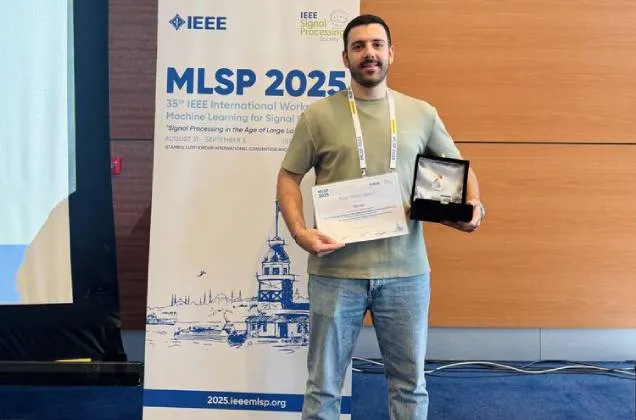31/05/2022
Organized by Sabancı University Nanotechnology Research and Application Center (SUNUM), the Nano Open Webinars continue with a webinar entitled “Flexible Nanoscale Electronics for Greener Emerging Technologies" that will be delivered by Dr. Dimitra Georgiadou at 11:00 on Wednesday, June 1, 2022.

Nanoscale electronic devices are among the subjects of interest of researchers working on new materials and techniques with advantages such as innovative, low-cost, efficient and durable.
Dr. Dimitra Georgiadou will talk about flexible nanoscale electronics for greener emerging technologies. To register for the Nano Open Webinar at 11:00 on June 1, 2022, otolab.sabanciuniv.edu
The webinar will be held in English.
About Dr. Dimitra G. Georgiadou
Dr. Dimitra Georgiadou is a Principal Research Fellow and UKRI Future Leaders Fellow leading the Flexible Nanoelectronics team in the School of Electronics and Computer Science at the University of Southampton. She also serves as the Deputy Impact Champion and Outreach Officer in the UKRI Centre for Doctoral Training in Machine Intelligence for Nano-Electronic Devices and Systems (MINDS-CDT). Previously she was Industrial Fellow at the Department of Materials, Imperial College London (ICL), working with PragmatIC, a UK-SME developing flexible radiofrequency electronic devices for the Internet of Things, and Marie Skłodowska-Curie Fellow at the Department of Physics (ICL).
Dimitra earned her PhD in Chemical Engineering/Organic Electronics from the National Technical University of Athens (NTUA), Greece, while she holds a BSc in Chemical Engineering from the same University. She also holds a Master’s Degree (Honours) in Advanced Materials Science awarded jointly from the Technical University of Munich, Ludvig-Maximilians University of Munich and University of Augsburg in Germany.
Research interests
Dimitra’s research interests are the fabrication and optimisation of nanoscale opto/electronic devices by applying novel materials concepts and alternative patterning techniques. She has co-developed adhesion lithography (a-Lith), while at Imperial College London, an innovative low-cost high-throughput technique for the fabrication of large aspect ratio (>100,000,000) metal electrode nanogaps (<15 nm) on a variety of substrates. These electrodes have been implemented in the fabrication of high-speed diodes for advanced electronic applications, in particular, radiofrequency identification tags (RFIDs) and RF energy harvesters, nanoscale LEDs, photodetectors and resistive switching memories. In her recently awarded Future Leaders Fellowship she explores the development of a new form of greener devices and systems that merge photonic, electronic and ionic effects, bringing new prospects for in-memory computing and artificial visual memory applications.




